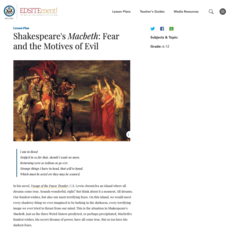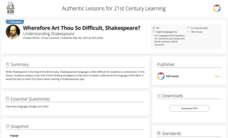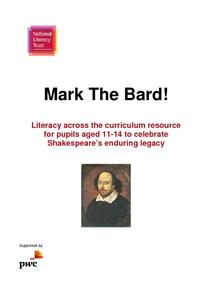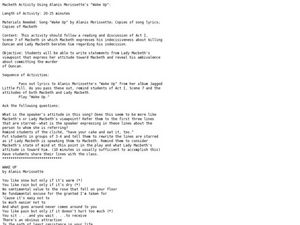National Endowment for the Humanities
Shakespeare's Macbeth: Fear and the "Dagger of the Mind"
High schoolers read and analyze Shakespeare's play, 'Macbeth.' They analyze how Shakespeare uses metaphors, imagery and dramatic cues to demonstrate Macbeth's response to fear, and perform without words a scene dramatizing Macbeth's...
Curated OER
Analyzing Atmosphere: Macbeth Murder Scene and Dagger Speech
Shakespeare's Macbeth (Act II, Scenes I and II) lacks explicit details of the murder of King Duncan, yet the author creates an atmosphere that allows us to visualize the event. Readers interpret the "Dagger Speech" by writing stage...
Shakespeare Uncovered
“Speak, I Charge You”: Macbeth On Your Feet, Not In Your Seat
“Is this a dagger which I see before me . . .” As part of a study of Macbeth, class members engage in a series of activities that get them up and moving. Individuals practice, then deliver, a line from the Scottish play. The entire class...
Curated OER
Shakespeare's Macbeth
After reading Act II of The Tragedy of Macbeth, give your class this prompt to complete. One other question is listed along with information regarding the divine right of kings. A full plan is not written out here, but the prompt is a...
National Endowment for the Humanities
Shakespeare's Macbeth: Fear and the Motives of Evil
High schoolers use an online search engine (or a printed concordance) to locate passages that highlight Macbeth's response to fear and his descent into evil. They analyze the motives of Macbeth's increasingly desperate and evil actions.
Curated OER
Macbeth News Broadcast
Here is an authentic assessment task for Shakespeare's Macbeth. Young literature scholars prepare, perform, and record a news broadcast about the major events in the play. For example, groups may choose to report on the death of Lady...
K20 LEARN
Wherefore Art Thou So Difficult, Shakespeare? Understanding Shakespeare
'Tis not easy to understand the language of the Bard! But, hark! Fret not! With the assistance of this joyous lesson, young players learn how to translate Shakespeare's English into modern language. Groups examine passages from Julius...
Curated OER
Shakespeare's Macbeth: Fear and Motives of Evil
Learners complete play and vocabulary analysis for William Shakespeare's Macbeth. In this Macbeth analysis lesson, students use an online research engine to locate passages that highlight Macbeth's response to fear and his descent into...
Curated OER
Macbeth
Students explore and analyze how to approach Shakespeare and create more meaning in a variety of contexts. In groups, they imagine three witches on the heath and trying to play it straight. They study various script extracts to evaluate.
Curated OER
Lady Macbeth's Cure
Students role-play the position of Lady Macbeth's nurse. They are to create a project or service that can cure her sleepwalking. They create their own commerical to sell their product.
Curated OER
What's in a Name? Considering the Shakespeare Authorship Question
Did Shakespeare really write all that stuff? After viewing a trailer for the film, Anonymous and reading Stephen Marche’s article “Wouldn’t It Be Cool If Shakespeare Wasn’t Shakespeare?” class groups read articles about the Shakespeare...
Curated OER
Macbeth: Denouement/Falling Action
Readers of Shakespeare explore denouement in Macbeth and track the play's falling action in Act IV, Scene 1. They complete a worksheet/table noting the content and significance of each of the three apparitions granted Macbeth by the...
Curated OER
Stomping and Romping with Shakespeare
Did you know that Green Eggs and Ham is written in iambic pentameter? Model the rhythm of language using Dr. Seuss’s tale. Direct class members to march about the room tapping their right foot on the first syllable and stomping their...
Curated OER
Literary Response and Analysis
Students analyze the archetype of 'the fall' in Shakespeare's Macbeth. In this literary analysis lesson, students work in tiered learning groups to analyze the characters of Macbeth and Lady Macbeth. Students use the book of Genesis as...
Curated OER
The Portrayal of the Witches
Eleventh graders discover the importance of the fortune teller in Shakespeare's Macbeth. After watching two interpretations of the play, they examine and compare the portrayal of the character. They create their own modern adaptation of...
Curated OER
So Foul and Fair a Play
Students watch various interpretations of Shakespeare's Macbeth in film. In groups, they examine the setting, characters, music and sequence. They compare and contrast the various films and discuss the differences. They write an essay on...
Curated OER
Exploring the Expository Scenes in Macbeth
Students examine the function of exposition in play structure. They will be able to develop multiple interpretations and visual and aural production choices for Shakespearean scenes and choose those that are most interesting.
Literacy Design Collaborative
Macbeth: Influence of Supernatural
Something wickedly wonderful this way comes in a lesson that focuses on Macbeth. After a close reading of the play, class members craft a literary analysis essay in which they use evidence from the text to show how Shakespeare uses the...
Curated OER
Macbeth Madness
Students analyze Shakespeare's Macbeth by completing the creative activities. In this Macbeth lesson, students discuss the timeline for William Shakespeare and identify the characters for Macbeth. Students read Act One, Scenes i-v of...
National Literacy Trust
Mark The Bard!
Commemorate the 400th anniversary of Shakespeare's death with a packet of cross-curricular literacy lessons and activities centered around two of the Bard's most popular plays, Macbeth and The Tempest. Class members look for evidence of...
Curated OER
MacBeth Activity Using Alanis Morissette's "Wake Up"
Students analyze Macbeth through the lens of a pop song. For this Macbeth lesson, students read Act I, Scene 7 of Macbeth and determine Lady Macbeth's viewpoint. Students read the lyrics to Alanis Morrissette's song 'Wake Up' and work in...
PBS
Supernatural Shakespeare and Macbeth
"A drum, a drum! Macbeth doth come." The withered and wild witches of Shakespeare’s Scottish play launch an examination of the fantastical elements in Act I, scene iii, paying particular attention to the action, imagery,...
Curated OER
When Shall We Three Meet Again?
Double, double toil and trouble; Fire burn, and caldron bubble. Macbeth’s witches provide young actors an opportunity to try their hand at small ensemble acting. Using Act I, scene I of Shakespeare’s play, groups of three take turns...
Curated OER
Children's Literature Across the Curriculum Ideas-Shakespeare and Macbeth: The Story Behind the Play
Students read Shakespeare and Macbeth: The Story Behind the Play by Stewart Ross. They complete a variety of cross-curricular activities surrounding the play and Shakespearian culture. Included are reading, art, math, science, writing,...

























